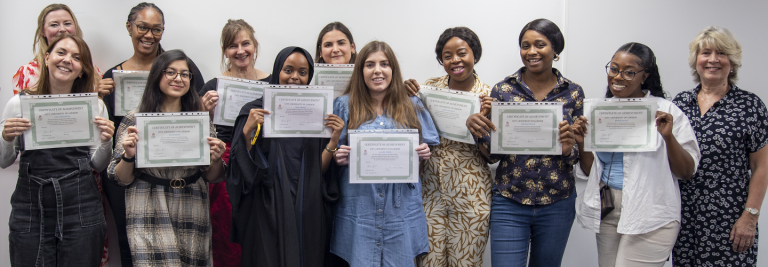International Men’s Day EDI event aimed to raise awareness of suicide and wellbeing
Published
Staff from across the University joined a special Equality, Diversity and Inclusion (EDI) event on International Men’s Day that aimed to raise awareness of male suicide and the overall wellbeing of men.
Titled ‘Let’s talk about male suicide’, the event on Friday 17 November involved Simon Grist, Head of Nursing in the School of Health and Psychological Sciences (SHPS) at City, University of London, and Betsy Scott, a Manager in the East London NHS Foundation Trust (ELFT) Education Team.
Raising awareness
Introducing the event, Michelle Ellis, Associate Dean for EDI in SHPS, thanked everyone for attending and spoke about the importance of the topic.
“This is the third event that we've had in relation to equality, diversity and inclusion as part of our calendar of events this year,” said Michelle. “This one is about International Men's Day and the theme is about raising awareness and reducing suicide in men. This is a really sensitive and challenging topic, but for all of us in the School, it is an important one to explore.”
During her talk – which took its title from Night Falls Fast, a book by Kay Redfield Jamison – Betsy discussed the history of suicide as well as its prevalence. In particular, she said that in 2021, 5219 people died by suicide, with three times more men dying than women. She said:

Shifting language
Betsy also spoke powerfully about how the language has shifted around how we talk about suicide, which was considered a crime up until 1961, and how such archaic laws contributed to the language used, with people using the word “commit” to refer to it. More recently, the language has shifted, and “died by suicide” is used. Betsy also referenced organisations throughout who offer Suicide Awareness training and the Annual City Hope Conference.
In addition, the complexities around risk assessment were discussed, as well as thought vs intent, given how some people live with the thought of suicide all their lives. Betsy also spoke about the importance of active listening, and how showing vulnerability yourself can give people permission to talk about their experiences.
“It's about intervening before thoughts of suicide turn into behaviour, and one way of doing that is to make thoughts of suicide something normal to talk about, breaking down that stigma and spreading the message of hope that suicide is one of the most preventable deaths. Usually what a lot of charities that work in this area find is that if there's another option being offered, most people will take it,” added Betsy.

Clinical experience
After Betsy’s talk, Simon Grist spoke about his experience of working with people with suicidal thoughts. Having trained as a mental health nurse and then later as a cognitive behavioural therapist, Simon spoke specifically about a particular male service user who he saw during a night shift at a hospital while working as a liaison nurse.
During his moving talk, Simon spoke about the complexities of risk assessment for practitioners and how it’s very difficult to always get it right. He said:
At the end of his talk, Simon also played a video produced by Norwich City Football Club for World Mental Health Day, which highlights how difficult it can be to identify those at risk of dying by suicide.
Get support
For people who may be affected by the content of this article, a list of organisations from which to seek support in the UK:
Visit the Agenda Alliance website for a list of organisations relevant to their work.
If you're a student at City and need support, you can get help through the Student Counselling and Mental Health Service.
If you're a member of staff at City, you can access support through the Occupational Health Service.
If you, or someone you know, needs support there are a number of helplines you can call:
Samaritans
Whatever you’re facing, a Samaritan will face it with you. We’re here, day or night, for anyone who’s struggling to cope, who needs someone to listen without judgement or pressure.
Call: 116 123 for free from any UK mobile phone network or landline provider (restrictions may be in place on landlines from some offices, organisations and care homes).



